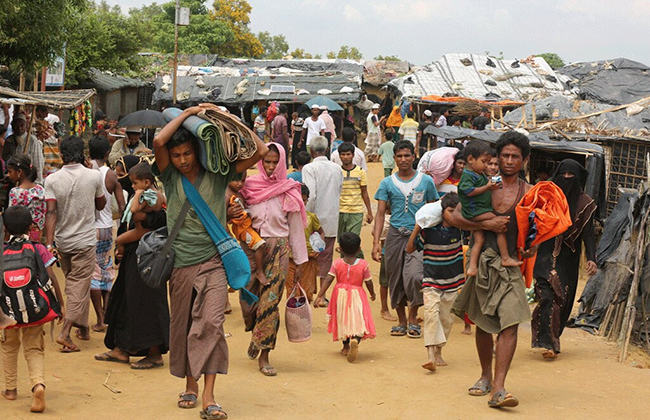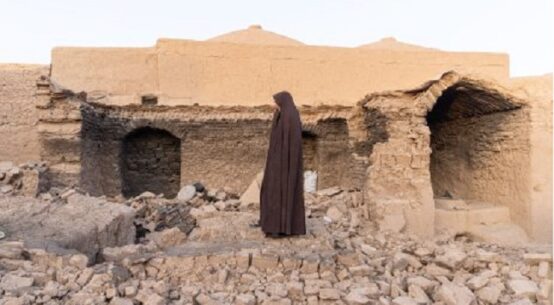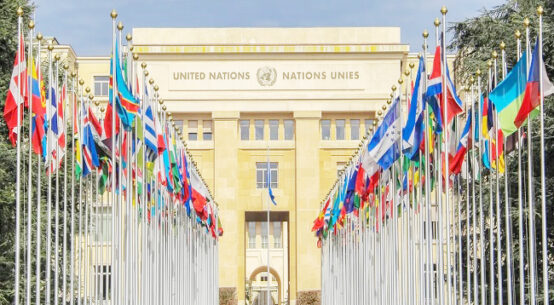
The month of August in 2017 was the cruelest for the Rohingya diaspora as they fled the Rakhine state in Myanmar to Bangladesh for safety following a major crackdown by the Myanmar Army on the ethnic religious minority. The Rohingyas crossed the Naf River that divides Bangladesh and Myanmar with whatever they had in their possessions and found a shelter over here five years back and have since been living, with hopes to return to their motherland hanging in the balance.
Parents with little kids, many a pregnant woman and senior citizens – all ended up being in Cox’s Bazar in Bangladesh, a country that showed utmost generosity to receive the persecuted minorities with open arms. It was the sheer magnanimity on the part of Bangladesh that saved the Rohingyas, but will this benevolence boomerang on the host community in terms of economical and ecological challenges that are likely to overshadow the country’s consistent economic growth with GDP hovering around 7 per cent till the pandemic?
This is the question to explore and look for a solution because the Rohingya issue has many factors associated with it. Since the mass exodus of Rohingyas from their ancestral land, there has virtually been no concrete progress in taking back the refugees by the Myanmar authority. The military regime of the neighboring country that controls the state affairs dilly-dallies over a sustainable and dignified repatriation process. The changing attitude of the Junta as well as hostility between the Arakan and Myanmar armies makes the repatriation issue all the more uncertain, and nobody knows when or ever it will happen.
In his speech on ‘Myanmar in a PodShell’ Myanmar analyst Tony Waters, a professor of sociology at Payap University in Chiang Mai, Thailand, predicted that “repatriation to Rakhine is not going to happen, that is self-evident for everybody who follows Myanmar.”
So if repatriation is a long shot, will Bangladesh be able to cope with the socio-economic impact posed by the largest refugees in the world?
Let me bring forth some issues that pop up in the wake of Rohingya sheltering. The procrastination over repatriation will result in growth of more and more Rohingya population requiring more basic needs. Although a lot of NGOs are working for the displaced community in different camps in Teknaf, Cox’s Bazar and new Rohingya location Bhasan Char, they cannot put at bay the demographic imbalance that is already underway.
According to the Bangladesh Government and the UNHCR joint report on 31 March, 2022, a total of 9,26,561 refugees are sheltered in different camps in Teknaf, and every year 35,000 babies are born in the camps with 3.77 per cent growth rate whereas Teknaf with a population of near about three lakh sees 1.77 per cent growth. This suggests that the refugee population will surpass the local population in no time.
When it comes to ecological impact because of the temporary habitat, the damage is extensive. 3,918-acre natural and 1,879-acre man-made forests have already been plundered due to the refugee sheltering, according to a study. It finds that 42 per cent of Rohingyas living in Kutupalong are directly reliant on the forests for cooking wood, thereby contributing to ecocide.
Besides, societal impact and security issues are posing a major concern as in recent days frequent murders in Rohingya camps, including shooting to death of Rohingya leader and Arakan Rohingya Society for Peace and Human Rights chair Mohibullah on September 29, 2021 by unidentified gunmen in Kutupalong camp in Cox’s Bazar, have taken place bearing an ominous sign.
Now the question is how long the Rohingyas could be encamped in the designated areas, with their numbers growing day by day. Eventually they will spread out in search of employment and compete for menial work with local population through offering cheap labor. For lack of jobs they would likely resort to crimes for money, thereby unsettling peace in the areas they are residing. The forcibly displaced persons are already known for smuggling yaba from Myanmar – an activity that is taking a heavy toll on the youth population in Bangladesh. The youth of today are turning to the forbidden crazy drug out of addiction, and committing anti-social crimes. Some vested interests in collusion with the refugees are engaged in yaba trade, the tranche of which is caught by the lawmen off and on that suggest that the use of stimulant drug is spreading like an epidemic.
Problem would be graver when some anti-state actors would entice the Rohingyas to commit violent crime like killing in exchange of money, pinning them against one another. On the other hand, should the Rohingya population outnumber the inhabitants, there will arise certain issues like overcrowding, congestion and extra pressure on public services. In addition, the unskilled displaced community will lead to a decline in rate of wages and even unemployment of native workers.
Allegations had it that NGOs like Adventist Development and Relief Agency (ADRA) and Al-Markazul Islami working for Rohingya camps discouraged the refugees from returning to their homeland, thus playing a negative role, and their operations had been halted by the government.
Therefore, the sheltering of Rohingyas has put Bangladesh in a rough patch confronting numerous challenges from multiple fronts. While Non-Government Organisations should offer their dedicated services to the affected people, they are trying to fish in troubled waters.
Where does the solution lie? Is it enough for the international agencies to just provide monetary support to bear the cost of Rohingya sheltering by Bangladesh? Following the initial support the host country received from donors and UN agencies, such assistance has slowed down. With the funding on the wane, the Rohingya diaspora continues to face unmet basic needs including sanitation facilities and livelihood opportunities while the Bangladesh government shall have to bear this refugee burden as long as repatriation does not take place amid the ongoing recession caused by the Covid-19 pandemic and the ongoing war between Russia and Ukraine.
The Rohingya refugee crisis will not just hit Bangladesh alone, it will spread across the regions till a permanent solution – safe and dignified return of the refugees to their country or origin – is reached.
The regional powers need to understand this very truth and play a proactive role as suggested by the UNHCR in whatever way they can to bring about a sustainable solution to the world largest refugee problem.
Subrata Kumar Roy is a senior sub-editor


